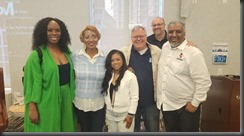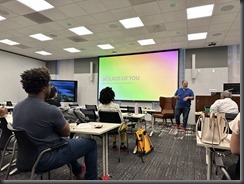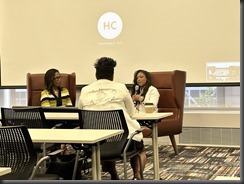 Michael Brown of Microsoft's Commercial Software Engineering has hosted the Juneteenth Conference virtually for years. This year, he decided to hold an in-person event. Although he currently lives in the Seattle area, Michael selected Chicago - where he grew up - as a location for the 2023 event. Ultimately, he chose a hybrid format that attracted 40-50 people, most of whom were in-person at the downtown Chicago Microsoft office.
Michael Brown of Microsoft's Commercial Software Engineering has hosted the Juneteenth Conference virtually for years. This year, he decided to hold an in-person event. Although he currently lives in the Seattle area, Michael selected Chicago - where he grew up - as a location for the 2023 event. Ultimately, he chose a hybrid format that attracted 40-50 people, most of whom were in-person at the downtown Chicago Microsoft office.
The conference began and ended with all attendees in the same room listening to Tim Banks (opening keynote) and Minda Harts (closing interview).
 Tim Banks delivered an excellent keynote address titled "The Solace of You," he encouraged people to identify their true selves and avoid tying their identity solely to their occupations. He recalled the days when African Americans had no choice but to dress and act like white military men and when everyone was discouraged from revealing any hint of mental illness or deviation from the norm. Change happens when people use their available platform to advocate for themselves and others, much as Tim has done speaking for groups underrepresented in the tech industry. "Use your voice," he told us.
Tim Banks delivered an excellent keynote address titled "The Solace of You," he encouraged people to identify their true selves and avoid tying their identity solely to their occupations. He recalled the days when African Americans had no choice but to dress and act like white military men and when everyone was discouraged from revealing any hint of mental illness or deviation from the norm. Change happens when people use their available platform to advocate for themselves and others, much as Tim has done speaking for groups underrepresented in the tech industry. "Use your voice," he told us.
 The day's final session brought everyone back to this room as Brandi Brown interviewed Minda Harts. Minda is the author of "The Memo" and "Right Within: How to Heal from Racial Trauma in the Workplace." Minda shared her journey in corporate America, where she was the only woman of color in almost every organization she joined. After years of dealing with microaggressions from managers and co-workers, she chose a different path, writing about and publishing her experiences and how she began to heal from toxic work relationships.
The day's final session brought everyone back to this room as Brandi Brown interviewed Minda Harts. Minda is the author of "The Memo" and "Right Within: How to Heal from Racial Trauma in the Workplace." Minda shared her journey in corporate America, where she was the only woman of color in almost every organization she joined. After years of dealing with microaggressions from managers and co-workers, she chose a different path, writing about and publishing her experiences and how she began to heal from toxic work relationships.
Eight more sessions by eight speakers filled the four time slots between Tim's and Minda's sessions.
Some of the presentations were technical. Kedasha Kerr gave a presentation in which she used GitHub co-pilot to write a node application that called the Chat GPT API. Dolly Desir walked through the basics of logging and monitoring in her talk "From Zero to Monitored."
But most presentations focused on people, relationships, careers, and workplaces. I heard multiple times that the conference was not intended to be a technical conference; instead, it was a conference for black people in tech.
Athena Sayaka told her story of channeling her traits into productivity in her talk "How To Leverage Your Neurodivergence At Work." When Ashley Janelle presented "4 Steps to Becoming a UX/UI Designer," she spoke about ways to build your portfolio and enter the field.
For most time slots, I had to choose between two appealing sessions to attend. Fortunately, the talks were recorded and are or will be available here.
Michael and Brandi Brown did the work of organizing and running the conference. Because I live in Chicago, I and some others in the Chicagoland area helped to promote it locally and facilitate communication between the Browns and the local office.
I was not the target audience for this event. All the speakers and 90% of the attendees were black, and the messaging was often directed at African Americans (I heard things like "This is what we experience"; "This is what we need to do"). But I never felt excluded and learned something from the messages I heard. The conference provided a perspective that can help me be aware of how my words and actions may be seen by others, even if I do not intend them in this way.
Everyone I spoke with got something out of the day.